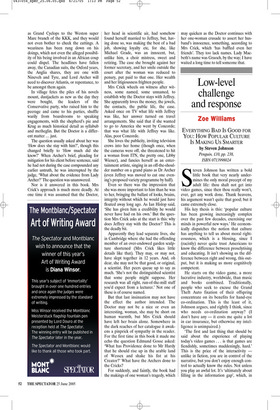Low-level challenge and response
Zoe Williams
EVERYTHING BAD IS GOOD FOR YOU: HOW POPULAR CULTURE IS MAKING US SMARTER by Steven Johnson Penguin, £10, pp. 238, ISBN 0713998024 Steven Johnson has written a bold little book that very nearly undermines the only moral precept of my adult life: thou shalt not get into video games, since then thou really won’t, ever, get any work done. Thank heavens, his argument wasn’t quite that good; but it came extremely close.
His key thesis is this: ‘popular culture has been growing increasingly complex over the past few decades, exercising our minds in powerful new ways.’ He economically dispatches the notion that culture has anything to tell us about moral righteousness, which is a blessing, since I (racistly) never quite trust Americans to know the difference between proselytising and educating. It isn’t showing us the difference between right and wrong, this output, but it is making us more cognitively competent.
He starts on the video game, a more lucrative industry, worldwide, than music and books combined. Traditionally, people who seek to excuse the Grand Theft Auto fixation of their offspring concentrate on its benefits for hand-eye co-ordination. This is the least of it, Johnson argues, and rightly I think, since who needs co-ordination anyway? (I don’t have any — it costs me quite a lot in car insurance, but otherwise my intelligence is unimpaired.) ‘The first and last thing that should be said about the experience of playing today’s video games ... is that games are fiendishly, sometimes maddeningly, hard.’ This is the price of the interactivity unlike in fiction, you are in control of the narrative, but you don’t enjoy enough control to actually know the rules. Not unless you play an awful lot. It’s ‘ultimately about filling in the information gap’, which, in turn, gives you an element of deferred gratification, and teaches you ‘the probe, hypothesise, reprobe, rethink’ cycle, which is ‘the basic procedure of scientific method’.
There are two problems with this argument: first, it’s a bit like teaching children to count using ten Smarties — sure, they’ll learn the basics of mathematical method, but could you really call the Smarties the engine of that understanding? Could you claim that the invention of Smarties had made us better at maths? Gamers might have mastered the basics of scientific method, but in fact that method is relatively straightforward — the cognitive benefit is derived when you marry it to matters of meaningful complexity, not just the contrived complications of another gamer’s adolescent imagination. Second, if games are that hard, how is it that stoned people are so good at them? They’re no good at anything else.
The argument about television works better, and has some nice little graphs demonstrating how much denser are the plotlines of today’s programmes than those of the Seventies and Eighties. The Sopranos has ‘multithreaded drama’ coming out of its bullet-wounds, whereas Dragnet, or even Starsky and Hutch, made do with one or at most two interrelated plots. Again, I’m not totally convinced Dallas, Johnson concedes, had interwoven threads ‘but the actual content ... was fluff’.
Fine, except that the ‘fluff’ content of video games posed no problem to the author, since those are about ‘cognitive challenges’, not ‘the themes and characters they represent’. Well, if gaming can get away with posing a cognitive challenge, rather than a theme, why can’t Dallas? Why can’t Coronation Street? If interwoven storylines are so great a challenge, how does one explain the challenges of Shakespeare, whose plot convolutions generally amounted to one important family, one less important family, occasionally brought together by a flash of lust (you’d never get away with anything as basic as King Lear, plotwise, in 24).
Ultimately, though, it is only because the book has so much of interest in it, probes (as well as reprobing and rethinking, naturally) so interestingly into the components of modern culture that one feels moved to argue with it so closely. It most certainly isn’t fluff; it definitely presents a wide range of cognitive challenge. I’d love to take issue with Johnson’s line on reality TV, on the ‘IQ spike of the past 30 years’ (a statistical anomaly based on the rise of the Raven’s Test, in my view ... But enough of that). Unfortunately, I think my intelligence would be better tested by going to watch Celebrity Love Island.



































































 Previous page
Previous page